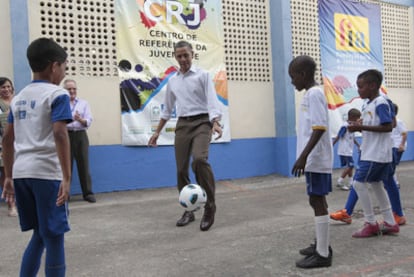Obama stays focused on regional tour
US president visits El Salvador on last leg of visit despite Libyan crisis
Despite the mounting pressure generated by the Libyan crisis and the threat of a nuclear disaster in Japan, US President Barack Obama continued on the third and last leg of his first official Latin American tour with a stop in El Salvador on Tuesday before returning home.
Following talks with Brazilian and Chilean Presidents Dilma Rousseff and Sebastián Piñera, in which he promoted US exports ? including the sale of Boeing F18 fighters ? the US leader was scheduled to discuss drug trafficking and security issues with Salvadoran President Mauricio Funes.
The White House had billed this trip as an important gesture to "play catch-up" in a region that has often been neglected by past US administrations as well as a chance to sell US exports and help the domestic economy.
In Brazil, Obama lauded the country's progress from an impoverished nation just 50 years ago to an economic giant that has now surpassed Italy as the seventh-largest economy in the world.
"This is not a country of the future. For the people of Brazil, the future has arrived," Obama said during a visit on Sunday to Ciudad de Dios, Rio de Janiero's most famous favela, or shantytown, where he kicked a soccer ball around with some youths.
"The people should not look at the favelas with pity but instead as birthplaces of presidents, lawyers, doctors, artists and people with solutions," he went on to say.
There were sporadic protests over Obama's visit, which was overshadowed by negative local reaction to US air strikes on Libyan defense forces. But among Brazil's predominately black population, many said they admired the African American president simply for being the first of his race to lead the world's largest economic and military power.
"People identify with the self-made man, with his discourse, with his family," Hedio Silva Jr., a former secretary of justice in Sao Paulo state, told The Washington Post. "All this generates hope and feeds the dream of black people in Brazil: that they, too, can access power."
Obama pushed for the Rousseff administration to purchase a number of F18 fighters as part of a technology transfer package as Brazil attempts to modernize its military. The Boeing fighter is competing with the French Rafale fighter jet of Dassault Aviation for the Brazilian bid, and another jet made by Saab.
While Rousseff told US officials earlier this year that she believed that the F18 offer was the best among the three fighter choices, she offered Obama no promises.
In Chile, where Obama traveled on Monday, Piñeda and Obama discussed a proposal for US training of Chilean nuclear scientists, in spite of the fact that many lawmakers in Santiago have said they are opposed to the idea in light of the recent emergency situation at the Fukushima plant in Japan.
Some Chilean groups had also called for Obama to make a public apology over the United States' role in the bloody coup that toppled Marxist President Salvador Allende in 1973. But the US leader made no mention of the coup or the CIA's role behind it.
Just hours before his arrival, a small bomb exploded outside a US cultural center, shattering several windows. Police said that they didn't know whether the incident had anything to do with the president's visit.
On Tuesday, more than 30 organizations, including university groups, planned to demonstrate in El Salvador when Obama was expected to arrive in the capital for the third and last leg of his tour. Obama was to meet with President Funes for several hours before heading home to Washington.

Tu suscripción se está usando en otro dispositivo
¿Quieres añadir otro usuario a tu suscripción?
Si continúas leyendo en este dispositivo, no se podrá leer en el otro.
FlechaTu suscripción se está usando en otro dispositivo y solo puedes acceder a EL PAÍS desde un dispositivo a la vez.
Si quieres compartir tu cuenta, cambia tu suscripción a la modalidad Premium, así podrás añadir otro usuario. Cada uno accederá con su propia cuenta de email, lo que os permitirá personalizar vuestra experiencia en EL PAÍS.
¿Tienes una suscripción de empresa? Accede aquí para contratar más cuentas.
En el caso de no saber quién está usando tu cuenta, te recomendamos cambiar tu contraseña aquí.
Si decides continuar compartiendo tu cuenta, este mensaje se mostrará en tu dispositivo y en el de la otra persona que está usando tu cuenta de forma indefinida, afectando a tu experiencia de lectura. Puedes consultar aquí los términos y condiciones de la suscripción digital.








































